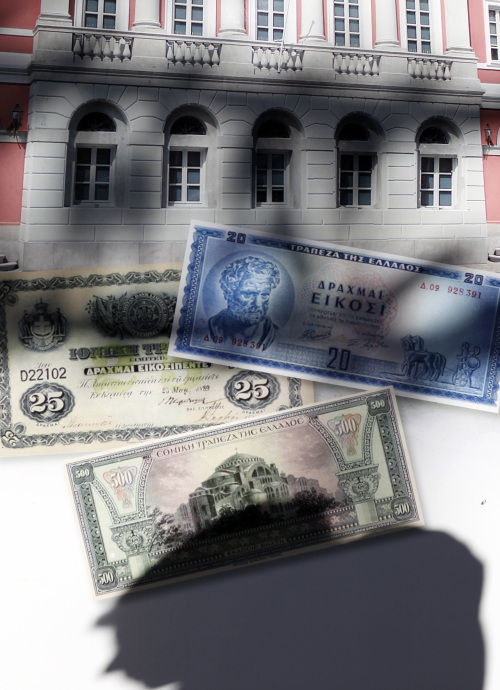 |
A pedestrian casts a shadow across an advertisement displaying Greek drachma notes outside the headquarters of Alpha Bank AE in Athens. (Bloomberg) |
ATHENS (AFP) ― Greece launched fresh talks Wednesday with private creditors amid hopes for a deal to give the beleaguered eurozone a much-needed boost, as powerhouse Germany cut its 2012 growth forecast.
“Our estimation is that we might have an agreement before the end of the week,” a finance ministry official told journalists after Finance Minister Evangelos Venizelos and Prime Minister Lucas Papademos resumed talks with Charles Dallara, head of the Institute of International Finance and lead negotiator for the banks.
After meeting for two-and-a-half hours, Venizelos told lawmakers that the talks had resumed and would continue on Thursday.
An agreement with banks and other institutional investors would open the way for a separate funding deal from the International Monetary Fund and EU peers, and help calm market fears of a wider crisis within the 17-nation eurozone.
In Washington, the IMF said it would seek up to $500 billion in new funds as the European debt crisis threatened the global economy.
With several European countries veering on recession and Greece on the brink of default, the IMF said it lacks the resources to be the planet’s lender of last resort.
“Based on staff’s estimate of global potential financing needs of about $1 trillion in the coming years, the Fund would aim to raise up to $500 billion in additional lending resources,” the global crisis lender said in a statement.
In reference to talks with banks, Papademos said in an interview published in the New York Times on Wednesday that “taking into account the complexity of the exercise, I would say that we are very close to reaching an agreement.”
The negotiations are aimed at cutting Greece’s debt with private creditors by about 100 billion euros ($128 billion), and would go a long way towards easing the nation’s staggering total debt of more than 350 billion euros.
Talks stumbled Friday over the terms of new bonds that would replace some of the debt to be written off.
A deal would also allow Greece to start planning elections to replace its current caretaker government, and Papademos pointed to possible early elections “sometime in April” if the debt deal and a second bailout are concluded.
In Paris, a banking source told AFP the banking sector regulator ACP would require banks to take bigger provisions against potential losses from holdings of Greek public debt.
Their current level is 60 percent, but a note from Dutch bank ING said:
“Latest soundings point to a likely 68 percent haircut deal for Greek government bonds.”
The forecast figure was 50 percent of Greece’s privately-held debt.
In March, Greece could become the first developed economy in 60 years to default on its debt if it does not hammer out a deal with private creditors, clearing the way then for a second bailout by the EU and IMF.
The EU and IMF have made it clear that an agreement between Athens and the banks is essential for approval of that second package, which is worth 130 billion euros on top of 110 billion euros already pledged in 2010.
A credible deal is also key to making progress on the overall eurozone debt crisis, which has weighed on sentiment in global financial markets.
In Germany, Europe’s biggest economy, the government slashed its 2012 growth forecast on Wednesday to a paltry 0.7 percent from its previous estimate of 1.0 percent.
Economy Minister Philipp Roesler stressed however that business activity would continue to expand despite the crisis and there would be no recession.
Roesler forecast a 2013 rebound, with growth of 1.6 percent.
Nevertheless, Luxembourg premier Jean-Claude Juncker said the eurozone is “on the brink of a technical recession.”
“I think budgetary consolidation is an approach to which there is no alternative,” the head of the eurogroup said in Brussels.








![[Today’s K-pop] Blackpink’s Jennie, Lisa invited to Coachella as solo acts](http://res.heraldm.com/phpwas/restmb_idxmake.php?idx=644&simg=/content/image/2024/11/21/20241121050099_0.jpg)